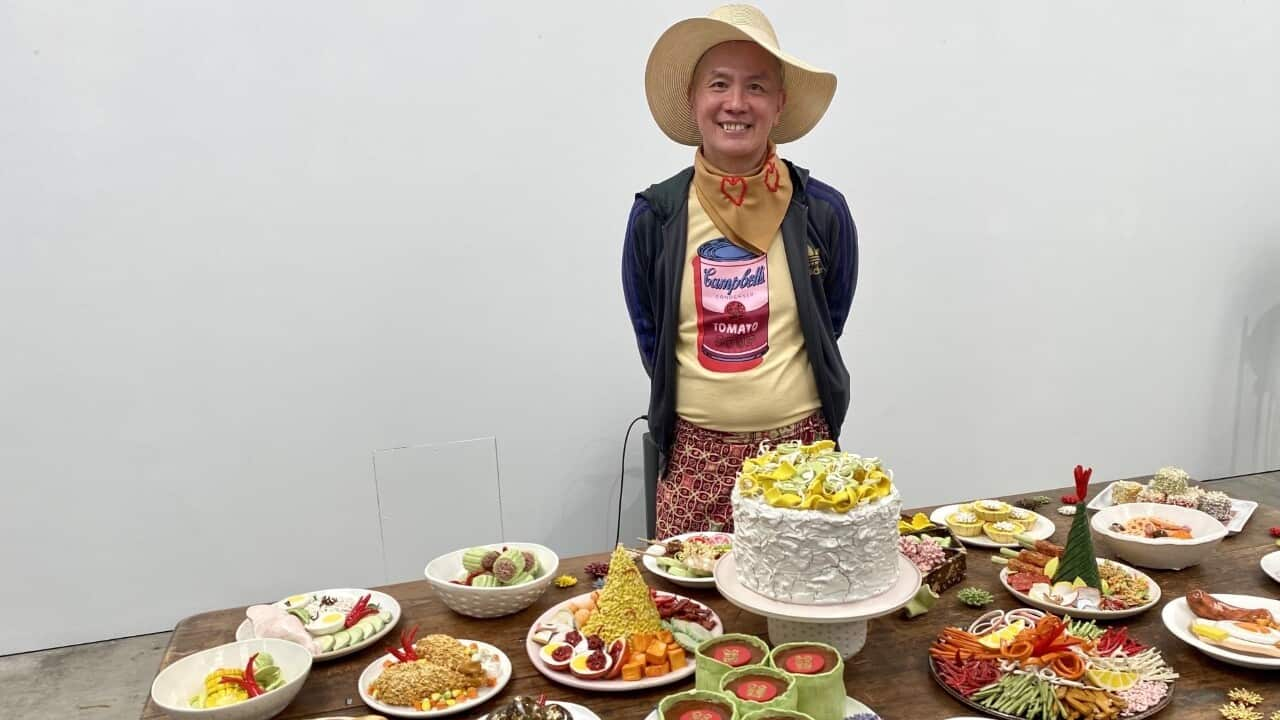Key Points
- Jayanto Tan was born Tan Seng Lie in Indonesia, during the authoritarian regime of President Suharto
- In the ‘60s, Suharto brought in a raft of policies that discriminated against ethnically Chinese Indonesians
- Jayanto fled in late 1997 to Australia, where he’s now a well-known visual artist
These days Jayanto Tan can say out loud that he's proud of his mixed background.
Back in the 1970s, when he was known as Tan Seng Lie – or Ali – and living in Bandar Tinggi, a remote village in Indonesia’s North Sumatra, it was a totally different story.
Jayanto was born in 1969 during the authoritarian regime of President Suharto to a Sumatran Christian mother and a Guangdong Chinese Taoist father.

Jayanto Tan's family photo, Sembayang Ceng Beng (Tomb-Sweeping Day) Tebing Tinggi, 1977. Credit: Jayanto Tan
A teacher at his primary school had to choose an 'Indonesian name' for him to be able to study there. Hence, Yanto was born.
“My identity was created as per Suharto’s requirements,” he said.
‘I was treated differently’
When Suharto came to power in 1965 after a coup, he brought in a number of policies that discriminated against ethnically-Chinese Indonesians who had lived in the country for generations.
This included forcing people to change their Chinese name into one that is ‘more Indonesian’.
But the bullying didn’t stop even after Jayanto had a new, more ‘acceptable’ name.
I wasn’t allowed to be under the spotlight at school.Jayanto Tan
“I wasn’t allowed to hoist a flag. Only those from the majority could,” Jayanto recalled, adding that his appearance marked him as different.
“I was called ‘Cina’, ‘banci’,” he said, referencing derogatory terms that mean ‘Chinese’ and ‘gay’, respectively.
Jayanto said it was not just people in his kampung – or village – doing the name-calling, but also people in Jakarta, where he moved after high school to study accounting.
Eventually, Jayanto found a way to a better life by fleeing to Australia in December 1997.
He considers himself lucky that he was able to come to Sydney just months before civil unrest and riots fuelled by economic crisis saw unemployment and food shortages peak the following May.
Chinese Indonesians were targeted at that time due to their wealth which led people to believe they were part of Suharto’s corrupt regime.

Jayanto Tan's work as a finalist in the North Sydney Art Prize 2022, Ritual Gathering Ceng Beng, North Sydney, 2022. Credit: Document Photography
No longer silenced
According to Jayanto, he first tasted ‘freedom’ when he walked down Oxford Street in Sydney one day. To his own surprise, no one called him names.
Having been oppressed for as long as he could remember, Jayanto admitted that he had gotten used to being silenced and showing only one part of himself: Indonesian.
“Being multicultural in Suharto’s era was forbidden,” he said.
Jayanto was still shy about showing his real identity in Australia, until one day his friends commented on his Chinese descent.
In that moment, Jayanto realised that in this country it was OK to be Indonesian with Chinese descent - and he decided to embrace it.
Being fond of art ever since he was a little boy in Sumatra, Jayanto took some time to finally decide that he’d express his repressed emotions through sculpture.
“I yelled through art,” said Jayanto, who went on to study art for seven years in Australia.
“I’m saying things I couldn’t say back then.”
‘We’re all of those colours, we’re beautiful’
Jayanto’s sculpting work centres on ‘market treats’, or what he explains as ‘fringe foods that people don’t pay attention to’ - something he identifies with.
His ceramic sculptures come in vibrant colours, showcasing the uniqueness of identity.
“The colours in my art characterise the skin colours of people,” said the sculptor, who admitted to being at his most productive as an artist during the COVID pandemic.
“They all stand together so beautifully - black, white, brown, yellow, pink, green.
“So when people look at my work and say ‘oh, so beautiful’; nah, you have to think that when people get together, we’re all of those colours, we’re beautiful.
“That’s the message.”

Jayanto Tan's 'Acute Actions: Responses to I am Not a Virus' Project Exhibition at 4A Centre for Contemporary Asian Art, Haymarket, Sydney, 2021. Credit: KAI-WASIKOWSKI
‘It’s always in your heart’
Having held multiple exhibitions in Australia to considerable acclaim, Jayanto said his life today is ‘a childhood dream come true’.
“I had a vision that one day I would definitely be able to make my family proud, that I could be accepted in the world," said the 2021 winner of the Georges River Sculpture Prize and Sydney Royal Easter Show's ceramic competition.
"So, I don't take revenge even though I was oppressed before. My trauma has become something beautiful.”
Proud to now call Australia home, Jayanto said he doesn’t resent Indonesia or its people.
"Don’t you forget your family and your home country just because your government hates you,” Jayanto said firmly.
“You were born in that country. It is a very beautiful place because we cannot choose it. It is the reality of our lives."
No matter how far you go, even though your skin is being bleached, or you’ve turned blonde, or you wear soft lenses, in your heart there is always your parent's culture.Jayanto Tan
Back in Indonesia, Jayanto used to spend Lunar New Year by listening to his parents’ favourite Chinese songs at home.
“But we were not allowed to go outside because we didn’t want to be called ‘Cina’,” he added.
In recent years, following his parents’ passing and with his siblings scattered around the world, Jayanto celebrates the special occasion through art exhibitions and gatherings with fellow artists.
For Lunar New Year 2023, Jayanto will host a 'Potluck Party' - an air-dried clay food-making performance - at Maitland Regional Art Gallery in the Hunter Valley in January.



